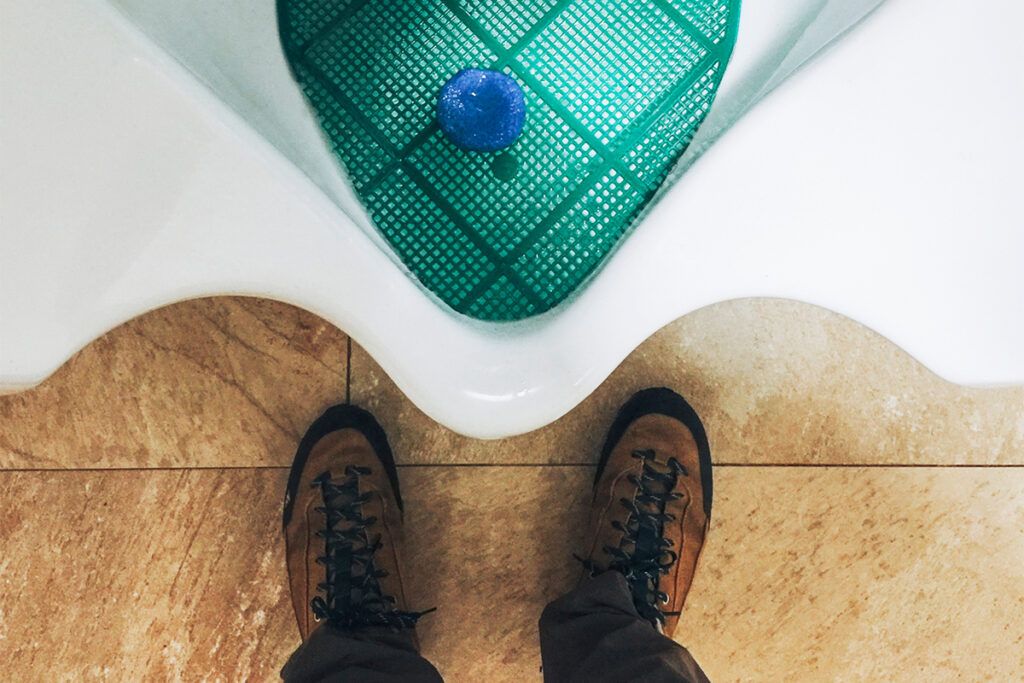Doctors may sometimes refer to difficulties urinating as urinary hesitancy. Other conditions may also mean you find it difficult to completely empty your bladder, find your urine stream weak, or strain to urinate with an intermittent stream.
People can develop this condition at any age, but it’s more common in older adults. If you experience ongoing symptoms of urinary hesitancy, you should contact a doctor to rule out any other potential underlying conditions that may make it more difficult to pass urine.
Without appropriate treatment, you can develop serious complications, including urinary retention. This is a condition in which people cannot fully empty their bladder, and it could be a medical emergency.
Sex and gender exist on spectrums. This article uses the term “men” when discussing people assigned male at birth to reflect language that appears in source materials.
Why might males encounter difficulties peeing?

Several health conditions may cause males to experience difficulties peeing.
One common cause is the benign enlargement of the prostate, a gland that sits near the bladder and the urethra. When it enlarges, the prostate may apply pressure to the urethral tube, making it more difficult to empty the bladder. Prostatitis, the inflammation of the prostate following an infection, also may result in difficulty peeing.
Difficulty peeing may also be a symptom of an underactive bladder. You can develop an underactive bladder due to many health conditions, including nerve damage, diabetes, and aging.
If you have multiple sclerosis (MS), you may experience bladder dysfunction, including urinary hesitancy, and you may find it difficult to empty your bladder fully.
Other potential causes of urinary hesitancy may include:
- side effects from certain medications
- kidney stones
- urinary tract infections (UTIs)
- urinary tract surgery
- sexually transmitted infections (STIs)
- a tumor causing pressure or a blockage in the urinary system
- psychological health conditions
- urethral stricture
What are the common symptoms of urinary hesitancy?
The initial symptoms of urinary hesitancy typically include difficulty starting or maintaining a urine stream. These symptoms may develop over time, but as they can happen gradually, you may not notice them right away.
Urinary hesitancy may develop into urinary retention. This can cause discomfort and swelling in your bladder. Urinary retention requires immediate medical attention. Its symptoms may include:
- severe pain in the lower abdomen
- inability to urinate
- swelling in the lower abdomen
- urgent need to urinate
Over time, urinary retention may become chronic. If you have this condition, you may experience:
- inability to fully empty the bladder
- frequent urination in small amounts
- hesitancy urinating
- urgent need to urinate with little success
- slow urine stream
- leaking urine without warning
- feeling of needing to urinate again after finishing to urinate
- lower abdominal discomfort
If you experience any of these symptoms, you should consider contacting a doctor or healthcare professional. These may also be symptoms of a UTI.
How is urinary hesitancy diagnosed?
Urinary hesitancy is a symptom, and diagnosis requires a combination of lab tests alongside a physical and medical history examination to establish the underlying cause. A doctor may carry out the following:
- a urine check to assess if the prostate has an infection
- an ultrasound examination to check if the bladder fully empties and the health of your kidneys
- a flow-rate check to determine the speed at which you pass urine
- urodynamic tests to check how well your urinary system works
What is the treatment for urinary hesitancy?
In general, the treatment for urinary hesitancy depends on its underlying cause. In some severe cases, doctors may need to drain your bladder, or you may need to undergo surgery.
But people can often manage urinary hesitancy with medications like:
- alpha-blockers to treat the symptoms of benign prostatic hyperplasia (BPH) and relax the bladder muscles, such as:
- 5-alpha reductase inhibitors to shrink the prostate and improve urine flow, including finasteride (Proscar, Propecia) and dutasteride (Avodart)
- a combination of 5-alpha reductase inhibitors and alpha-blockers
- antibiotics to treat any potential infection that may have caused problems in the urinary system, such as prostatitis and UTIs
If you need help covering the cost of medications, the free Optum Perks Discount Card could help you save up to 80% on prescription drugs. Follow the links on drug names for savings on that medication, or search for a specific drug here.
